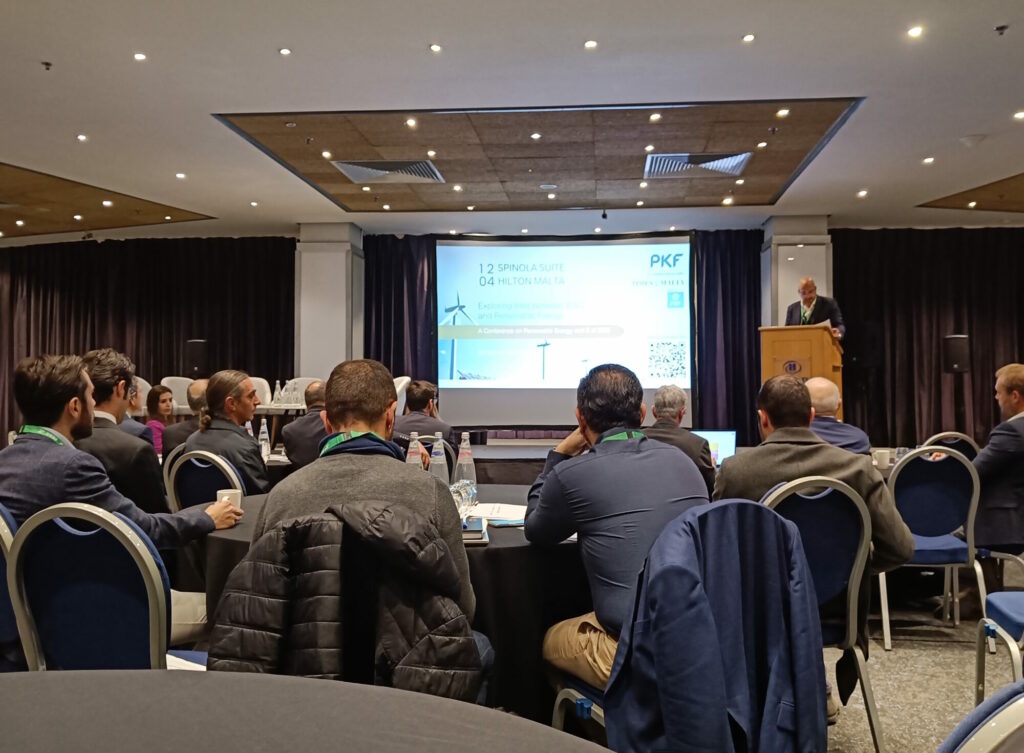As businesses continue to strive to adopt sustainable practices, the importance of environmental, social, and governance (ESG) factors for businesses has grown in recent years. Among the various solutions, renewable energy stands out as a key driver of sustainability, with its inherent alignment with environmental sustainability principles.
AIS Environment attended a conference discussing the link between these two important aspects. Hon Environment Minister Dalli spoke about the opportunity for renewables in Malta at the event. Read more about our take on the matter below.
Renewable Energy in Malta

In the Maltese context, solar farms and offshore floating wind farms hold great potential for driving sustainable energy generation. They also align with ESG principles within the country’s Exclusive Economic Zone (EEZ). As a small island nation with limited land resources, Malta has been actively exploring sustainable energy options to reduce its dependence on imported fossil fuels and mitigate the impacts of climate change.
The key sources which should be prioritised are solar farms on land and offshore wind farms. Offshore wind turbine technology has advanced greatly in recent years. With the installation of a number of floating wind turbines which can be installed in deep waters of up to 800m. This technology is ideal for our small island nation, since our EEZ is almost 230 times larger than our land area.
Environment: Shifting to Renewable Energy And Preserving Nature
Climate change is a pressing global issue, and mitigating its impact is a top priority for businesses and governments alike. Sources, such as solar, wind, hydropower, and geothermal, offer a cleaner alternative to fossil fuels, which emit harmful greenhouse gases when burned. By switching to these sources, companies can drastically reduce their carbon footprint and contribute to global efforts to combat climate change.
Additionally, these sources have a smaller environmental footprint compared to fossil fuels. Extracting and burning fossil fuels often result in habitat destruction, pollution, and other negative impacts on nature. In contrast, renewable energy projects can be designed and implemented with minimal disruption to ecosystems. In this way, it preserves biodiversity and protects natural resources. This aligns with the environmental aspect of ESG, which emphasizes sustainable resource management and ecosystem preservation.
Social: Empowering Communities And Promoting Social Equity
Renewable energy also has significant social implications, which are closely linked to social factors. One of the most notable social benefits of these resources is its potential to empower local communities. Sources, such as solar and wind farms, can provide economic opportunities for communities through job creation, local investment, and revenue generation. A second social benefit is promoting social equity by improving access to clean and affordable energy, particularly in developing countries.
Governance: Ensuring Transparency And Accountability
Good governance is a core pillar of ESG, and renewable energy can contribute to this through its governance practices. These projects often require substantial investments and long-term operations, necessitating robust governance structures and practices. This includes transparent decision-making processes, effective risk management, and stakeholder engagement. Furthermore, companies involved in the projects need to establish strong governance framework. They have to be in line with the core principles of ESG so that they promote accountability, transparency, and stakeholder engagement.



Renewable Energy And ESG: The Link
The links between renewable energy and ESG are clear, with the first, serving as a catalyst for sustainable business practices. By integrating ESG pillars into their strategies, companies can leverage them to mitigate climate change, preserve biodiversity, empower communities, promote social equity, and enhance governance practices. As the world faces growing environmental and social challenges, the adoption of these resources as a key component of ESG strategies becomes increasingly important.
Embracing the synergy between renewable energy and ESG is not only a responsible business practice but also a strategic one. Consumers, investors, and regulators are increasingly prioritizing sustainable and responsible business practices, and incorporating sustainable sources into company strategies can enhance a company’s reputation, attract investment, and foster long-term resilience.
In conclusion, the integration of renewable energy and ESG presents a compelling case for businesses and investors to contribute to a more sustainable future. Renewable energy not only aligns with the environmental, social, and governance aspects. But also offers tangible benefits in mitigating climate change, promoting social welfare, and enhancing governance practices. By unlocking the synergies between renewable energy and ESG, we can create a better world for ourselves and future generations. Where economic prosperity, social well-being, and environmental protection go hand in hand.
Are you interested in learning more about the links between them? Read more in our previous blog post on ESG here. Feel free to contact us at AIS Environment to explore how we can help you navigate the intersection of sustainability and business success. Together, we can create a brighter, more sustainable future for our planet.
